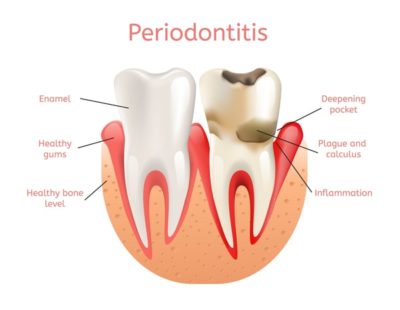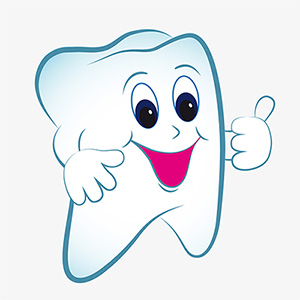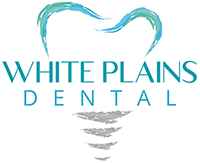What is gum disease?
 Also known as periodontitis, gum disease is more common than many would like to acknowledge. In 2012, the Centers for Disease Control and Prevention estimated that approximately 65 million adults in the United States, or 47% of the adult population, suffer from some degree of gum disease. Like so many other diseases, periodontitis is inflammatory. The gums surrounding your teeth become inflamed, damaging the tissues that hold your teeth in place. This also affects the surrounding bone and the teeth themselves.
Also known as periodontitis, gum disease is more common than many would like to acknowledge. In 2012, the Centers for Disease Control and Prevention estimated that approximately 65 million adults in the United States, or 47% of the adult population, suffer from some degree of gum disease. Like so many other diseases, periodontitis is inflammatory. The gums surrounding your teeth become inflamed, damaging the tissues that hold your teeth in place. This also affects the surrounding bone and the teeth themselves.
What Causes Gum Disease?
The causes of gum disease are wide ranging. Some individuals are genetically predisposed to periodontitis. Some may find their risk of gum disease elevated thanks to other diseases, like diabetes. Certain medications also list gum disease as a potential side effect.
However, a great deal of periodontitis cases are directly caused by smoking and/or poor oral hygiene. It can even be a problem with crowded or very crooked teeth; you may brush and floss regularly, but the tight or irregular spacing makes it hard to thoroughly clean every spot.
Periodontitis starts out as gingivitis. Gingivitis is when bacteria-laden plaque builds up in the mouth, and inflammation begins to take hold in the gums. If you have gingivitis, you can prevent it from progressing to gum disease.
What Are the Warning Signs of Gum Disease?
If you suspect you have gum disease, it’s important to see a dentist or periodontist right away for an exam. Symptoms those with periodontitis experience include:
- Tender or swollen gums
- Bleeding gums
- Receding gums that expose more of the tooth’s surface
- Loose teeth
- Bad breath
- Bad taste in mouth
- Changes in the way your top and bottom teeth fit together
- Changes in the way dentures fit
- Pain when chewing
- Increased sensitivity to hot, cold, or sugary foods and drinks

Did you know?
Gum Disease Treatment
What Are the Dangers of Gum Disease?
Tooth loss is a common outcome of advanced, untreated periodontitis. Yet as poor as that outcome is, it isn’t the worst. Gum infections can spread and impact other areas of the body, most notably the heart. The risk of the infection spreading should be of special concern to anyone with a history of heart disease or diabetes.
What Treatments Are There for Gum Disease?
Gum disease treatment very much hinges on how severe your case is. Your dentist or periodontist will also take into account the current state of your health. Milder, non-surgical treatments include professional cleanings, as well as scaling and root planing. Scaling is when dentist or dental hygienist removes plaque from the teeth, and planing is the smoothing of that clean surface. This makes conditions in the mouth favorable enough for the gums to hopefully reattach to the teeth.
For more advanced cases, there are various kinds of surgery to consider for gum disease treatment. A periodontist will choose from tissue regeneration, tissue grafts, bone surgery, and bone grafts. They may also consider pocket reduction surgery, which tightens the space between the teeth and gums, so that disease-causing bacteria can no longer flourish there.
How is Gum Disease Prevented?
Every patient with gum disease or gingivitis benefits from better oral hygiene. In addition to reversing gingivitis and halting the progression of periodontitis, this is the best way to prevent having either problem in the first place. Patients should brush twice daily, floss once daily, and use antibacterial oral rinses.
Since tobacco usage is also heavily associated with periodontitis, quitting smoking or chewing is highly recommended. Finally, regular visits to your dentist for professional cleanings are very effective in avoiding tooth loss (or worse) from gum disease.
